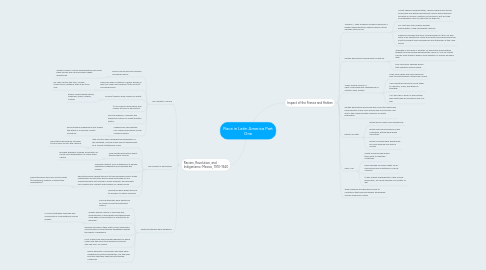
1. Impact of the France and Haitian
1.1. January 2, 1893 Frederick Douglas delivered a speech dedicating the Haitian pavilion at the Chicago World's Fair
1.1.1. In that speech Douglas states, "Blacks owed much to the Americans and British abolitionists and to the antislavery societies in various countries of the world, "but we owe incomparably more to Haiti than to them all."
1.1.2. For Haiti was "the original pioneer emancipator of the nineteenth century."
1.1.3. Frederick Douglas was born a slave himself in 1818. He won fame as an abolitionist orator and writer and had become the most prominent black spokesman and statesman in the New World.
1.2. Haitian Revolution turning point of history.
1.2.1. Impinged in one way or another on the entire emancipation debate from the British parliamentary move in 1792 to outlaw African slave trade to Brazil's final abolition of slavery 96 years later.
1.2.2. This revolution showed blacks that liberation was possible.
1.3. 1780s French colony of Saint-Domingue was centerpiece of Atlantic slave system
1.3.1. They used slaves and land owned by free colored people to produced coffee.
1.3.2. 1787 exported almost as much sugar as Jamaica, Cuba, and Brazil all together.
1.3.3. 1791 and 1804 "pearl of the Antilles" was destroyed by revolution and civil war
1.4. Haitian Revolution reinforced the conviction that slave emancipation in any form would lead to economic ruin and to the indiscriminate massacre of white population
1.5. Effects of Haiti
1.5.1. British policy were more ambiguous.
1.5.2. British lived surrounded by slave majorities, British were white minorities.
1.5.3. British colonies were threatened by racial warfare and french armies.
1.6. April 1792
1.6.1. South Province had armed their slave to fight the mulattoes.
1.6.2. Paris decreed full equal rights for all free blacks and mulattoes in French colonies
1.6.3. It was a great achievement of the French Revolution, full racial equality as a matter of law.
1.7. 1893 Frederick Douglas gave voice to conditions that had long deeply embedded African American culture
2. Racism, Revolution, and Indigenismo: Mexico, 1910-1940
2.1. The "Reality" of Race
2.1.1. Racial mix has become modern including Mexico.
2.1.1.1. Genetic bases of racial differentiation has never been proven and race has been rightly questioned.
2.1.2. There has been a mixture of many groups in result of Indian and Spanish (16th century). Including blacks.
2.1.2.1. By 18th century the term "Indian" meant fiscal category than as an tunic one.
2.1.3. Criollos/creoles "pure Indians or white"
2.1.3.1. Ethnic meant identification, language, dress, religion, culture
2.1.4. 1/3 of Mexico's population was "Indian" at time of Revolution.
2.1.5. Second problem, concerns the subjective nature of Indian/mestizo status.
2.1.6. Indigenismo represented non-Indian formulation of the "Indian problem"
2.1.6.1. Revolutionary indigenismo was simply the latest in a long line of elite formation.
2.2. The Impact of Revolution
2.2.1. 19th Century saw a progressive breakdown of the castelike, colonial order and its replacement by a society stratified by class.
2.2.1.1. Racial theories became stronger in the course of the 19th century.
2.2.2. How did the Revolution affect the prevalent racism?
2.2.2.1. Brought emphatic change, elimination of racism and rehabilitation of Indian were central
2.2.3. Indianism distinct from Indigenismo it denied imperative integration and asserted the Indians.
2.2.4. Revolution gave a great stimulus to this ideological shift. Indian contribution to Recolutio had no been premised on any Indianist project but revealed "Indian Problem" and brought non-Indians into contact with Indians on a grand scale.
2.2.4.1. Revolutionaries discovery of the Indian (troublesome sedition or supportive mobilization)
2.2.5. Revolution gave great stimulus to process of nation-building
2.3. Postrevolutionary Race Relations
2.3.1. Some authorities deny existence of racism in post revolutionary Mexico.
2.3.2. Indians whose culture is valorized and emancipation is proclaimed find themselves once again in the position of reacting to an ideology.
2.3.2.1. A conflict between ideology and sociopolitical circumstances leaves Indians.
2.3.3. Ideology proclaims their worth, even superiority, social political circumstances repeatedly display the reality of prejudice
2.3.4. Most Indians are discriminated against for being Indian and the same time admired for being "the real soul" of Mexico
2.3.5. Racial theorists of Porfiriato may have been relegated to dusty bookshelves, but the daily practice that their theories rationalized continues.
